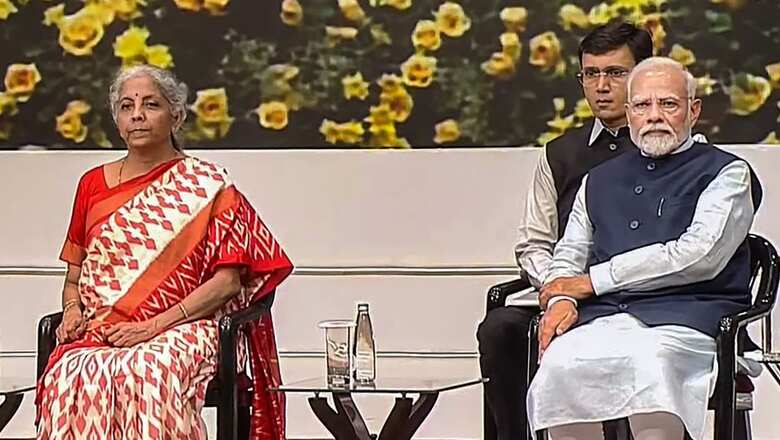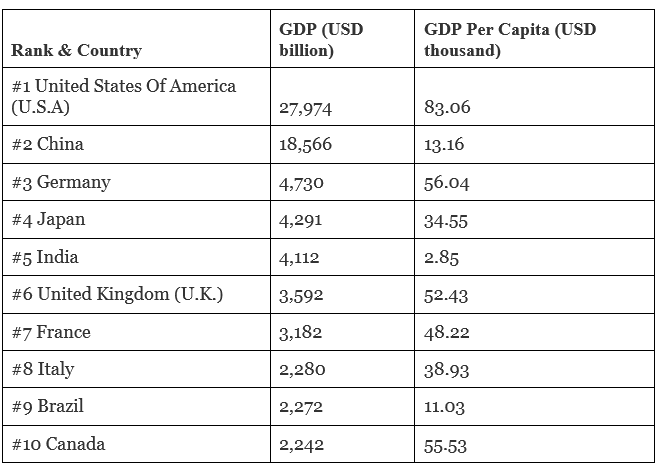
views
How would the recession in two major economies – the United Kingdom (UK) and Japan – impact India?
The United Kingdom slipped into recession, with its worst gross domestic product (GDP) performance in 2023 in years, just months ahead of a general election, official figures showed on Thursday, derailing Prime Minister Rishi Sunak’s pledge to generate economic growth. Britain’s gross domestic product (GDP) fell 0.3% in the final three months of 2023, following a 0.1% contraction in the July-to-September period, the Office for National Statistics (ONS) said. “All the main sectors fell on the quarter, with manufacturing, construction and wholesale being the biggest drags on growth…," ONS director of economic statistics Liz McKeown said in a statement.
Japan lost its spot as the world’s third-largest economy. Its economy is now the world’s fourth-largest after it contracted in the last quarter of 2023 and fell behind Germany. The government reported the economy shrank at an annual rate of 0.4% in October to December, according to Cabinet Office data on real GDP released Thursday, although it grew 1.9% for all of 2023. It contracted 2.9% in July-September.
Japan’s economy was the second largest until 2010, when it was overtaken by China’s. Japan’s nominal GDP totaled $4.2 trillion last year, while Germany’s was $4.4 trillion, or $4.5 trillion, depending on the currency conversion.
WHAT IS A RECESSION?
A recession is commonly defined as two consecutive quarters of contraction. Real gross domestic product is a measure of the value of a nation’s products and services. The annual rate measures what would have happened if the quarterly rate lasted a year.
WHERE THE UK STANDS
The ONS estimates that UK GDP increased by a meagre 0.1% in 2023. That’s the worst performance since 2009 when the economy was still reeling from the global financial crisis, if 2020, which was affected by the pandemic, is excluded. Last year’s weak rise in output follows growth of 4.3% in 2022. “Across 2023 as a whole, the economy has been broadly flat," McKeown said.
The news will come as a disappointment to Sunak, whose ruling Conservative Party is contesting two local elections in England on Thursday. UK finance minister Jeremy Hunt is widely expected to unveil moderate cuts to some taxes, despite the anaemic economy and sky-high government debt levels.
Notwithstanding the mild recession, the UK economy has fared much better than many economists feared a year ago, when several were predicting a considerably sharper downturn. “It’s overly dramatic to label the decline in economic activity in the second half of 2023 a recession, given that employment continued to rise, real wages rebounded and measures of business and consumer confidence returned to levels consistent with rising activity by the end of the year," said Samuel Tombs, chief UK economist at Pantheon Macroeconomics. “We think this is the end of the UK recession, and growth will stagger into positive territory but only slowly," economists at Nomura wrote in a note Thursday.
India & the UK: Negotiations between India and the United Kingdom for the proposed free trade agreement (FTA) are at an advanced stage, but India is keen to safeguard its interests. Commerce Secretary Sunil Barthwal on Thursday said the negotiations are taking time because “we want" to safeguard India’s interest. “India should commercially gain out of it and we should also be able to safeguard the interest of our farmers, PLI (production linked incentive) scheme goods. So, we are there to see that the deal is a fair deal," he told reporters at a press briefing.
According to the Department of Business and Trade data on February 2, the total trade in goods and services (exports plus imports) between the UK and India was £38.1 billion in the four quarters to the end of Q3 2023, an increase of 8.7% or £3.0 billion in current prices from the four quarters to the end of Q3 2022. India was the UK’s 12th largest trading partner in the four quarters to the end of Q3 2023, accounting for 2.1% of total UK trade.
WHERE JAPAN STANDS
A weaker Japanese yen was a key factor in the drop to fourth place, since comparisons of nominal GDP are in dollar terms. But Japan’s relative weakness also reflects a decline in its population and lagging productivity and competitiveness, economists say.
Japan was historically touted as “an economic miracle," rising from the ashes of World War II to become the second largest economy after the U.S.. It kept that going through the 1970s and 1980s. But for most of the past 30 years, the economy has grown only moderately at times, mainly remaining in the doldrums after the collapse of its financial bubble began in 1990.
The latest data reflect the realities of a weakening Japan and will likely result in Japan’s commanding a lesser presence in the world, said Tetsuji Okazaki, professor of economics at the University of Tokyo. “Many factors have yet to play out. But when looking ahead to the next couple of decades, the outlook for Japan is dim."
India & Japan: According to the MEA’s October 2023 report, bilateral trade totaled US$ 21.96 billion during FY 2022- 23. Exports from Japan to India during this period were US$ 16.49 billion and imports were US$ 5.46 billion.
JAPAN, GERMANY SIMILAR
Both the Japanese and German economies are powered by strong small and medium-size businesses with solid productivity.
Like Japan in the 1960s-1980s, for most of this century, Germany roared ahead, dominating global markets for high-end products like luxury cars and industrial machinery, selling so much to the rest of the world that half its economy ran on exports. But its economy, one of the world’s worst performing last year, also contracted in the last quarter, by 0.3%.
WHERE INDIA STANDS GLOBALLY: IMF DATA AS OF FEB 7

INDIA TO OVERTAKE JAPAN?
The gap between developed countries and emerging nations is shrinking, with India likely to overtake Japan in nominal GDP in a few years.
India, the world’s fifth largest economy in the world, is likely to overtake Japan to become the world’s third-largest economy with a GDP of USD 7.3 trillion by 2030, S&P Global Market Intelligence said in its issue of PMI in October 2023.
In January 2024, growth in India was projected to remain strong at 6.5 per cent in both 2024 and 2025, the International Monetary Fund (IMF) said in its latest World Economic Outlook update. The report pegged global growth at 3.1 per cent in 2024 and 3.2 per cent in 2025. Growth in China is projected at 4.6 per cent in 2024 and 4.1 per cent in 2025, with an upward revision of 0.4 percentage points for 2024 since the October 2023 World Economic Outlook, the IMF said, adding that in the US, growth is likely to fall from 2.5 per cent in 2023 to 2.1 per cent in 2024 and 1.7 per cent in 2025.
“Growth in India is projected to remain strong at 6.5 per cent in both 2024 and 2025, with an upgrade from October of 0.2 percentage point for both years, reflecting resilience in domestic demand," the IMF said in its latest report that was released in South Africa.
The IMF report reflects that India remains the fastest-growing country among emerging economies.
Pierre-Olivier Gourinchas, Chief IMF Economist, said the IMF expects slower growth in the US, where tight monetary policy is still working through the economy, and in China, where weaker consumption and investment continue to weigh on activity. In the euro area, meanwhile, activity is expected to rebound slightly after a challenging 2023, when high energy prices and tight monetary policy restricted demand.
WHEN INDIA OVERTOOK THE UK
India overtook the UK and France in 2019 to become the fifth largest economy in the world, a US-based think tank, World Population Review Reported. The report, which was published in February 2020, said in purchasing power parity (PPP) terms, India’s GDP (PPP) was US$ 10.51 trillion, exceeding that of Japan and Germany. Due to India’s high population, India’s GDP per capita is US$ 2,170 (for comparison, the US is US$ 62,794).
INDIA’s GROWTH STORY CONTINUES: FINMIN REPORT IN JAN
The financial year 2023-24 marked the third successive year of over 7 per cent GDP growth, and the Indian economy is expected to become the third largest in the world having a size of $5 trillion in the next three years.
“In the next three years, India is expected to become the third-largest economy in the world, with a GDP of $5 trillion. The government has, however, set a higher goal of becoming a ‘developed country’ by 2047. With the journey of reforms continuing, this goal is achievable," the finance ministry said in its report, ‘The Indian Economy: A Review January 2024’. It said FY24 marks the third successive year of 7 per cent plus strong growth of the Indian economy even as the global economy struggles to grow at more than 3 per cent.
The report said the macroeconomic data demonstrates the internal strengths of the Indian economy, which bestow on it the ability to grow notwithstanding unfavourable global economic conditions. “Therefore, it is eminently possible for the Indian economy to grow in the coming years at a rate above 7 per cent on the strength of the financial sector and other recent and future structural reforms. Only the elevated risk of geopolitical conflicts is an area of concern," it said.
India can aspire to become a $7 trillion economy in the next six to seven years (by 2030), it said.
Despite challenges posed by the global health crisis and variability in climate conditions, the agriculture sector has demonstrated remarkable tenacity and resilience, according to the report.
India became the world’s fourth largest stock market in the world by market capitalisation, overtaking Hong Kong thanks to significant interest from domestic and global investors in the Indian stock market and sustained IPO activity has placed the Indian market fourth in the world by market capitalisation.
GLOBAL RECESSION FEARS & INDIA’s LESSONS FROM 2008
With two members of the Group of Seven falling into global recession, the question emerges — Could there be a global recession?
The WEF, in its Global Risks Report 2024, in January had stated that “fears of an economic downturn are widespread among private-sector respondents, featuring as top-five risk in 102 countries".
Gourinchas, however, had last month told reporters that the average growth and global growth continue to be under historic averages. He had added that while geopolitical tensions and disruptions to shipping in the Red Sea had risks, “we are very far from a global recession". “The global economy continues to display remarkable resilience, with inflation declining steadily and growth holding up," he had said, according to reports.
While still hit, the Indian economy was shielded from massive negative effects of the global recession in 2008 owing to a number of factors. The dependence on agriculture averted the mass unemployment like other nations. Mortgage-backed securities and credit that brought down western financial institutions were ignored by Indian banks and financial institutions. There was an impact on India’s merchandise exports, but IT and BPO did not suffer extensively.
With CNN, AP, Agency Inputs













Comments
0 comment